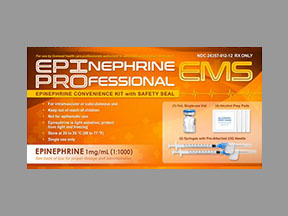
Epinephrine Professional Coupons & Savings Card – Discount Prices from $32.91
My prescription
Edit
1MG/ML, Epinephrine Professional (1 Kit)
Select pharmacy

CVS
$68.96
COUPON PRICE
Walmart
$32.91
COUPON PRICE
Walgreens
$43.90
COUPON PRICE
Albertsons
$52.20
COUPON PRICEEpinephrine Professional savings card
Show this card to your pharmacist
Walmart
$32.91
BIN
ID
PCN
GRP
019876
LH79A8FB7F
CHIPPO
LHX
Powered by
Price history for Epinephrine Professional
1 Kit, 1MG/ML
Average retail price for Epinephrine Professional
Average SaveHealth price for Epinephrine Professional
Our price history data is based on aggregated prescription data collected from participating pharmacies in America. Our prescription data updates daily to reflect the latest price changes. If you notice a missing data point, it means there wasn't sufficient data available to generate a monetary value for that date.
*Retail prices are based on pharmacy claims data, and may not be accurate when we don't have enough claims.
Epinephrine Professional dosage forms
Dosage Quantity Price from Per unit 1MG/ML 1 Kit $32.91 $32.91
| Dosage | Quantity | Price from | Per unit |
|---|---|---|---|
| 1MG/ML | 1 Kit | $32.91 | $32.91 |
Who can administer epinephrine?
Epinephrine can be administered by healthcare professionals such as doctors, nurses, and paramedics. In emergency situations, individuals who have been prescribed an epinephrine auto-injector, such as those with severe allergies, can self-administer it or have it administered by someone nearby who is familiar with its use.
Can an EMT administer epinephrine?
Yes, an Emergency Medical Technician (EMT) can administer epinephrine. EMTs are trained to recognize anaphylaxis and can administer epinephrine, often using an auto-injector, as part of their emergency response protocols. However, the specific scope of practice may vary depending on local regulations and protocols.
Who prescribes epinephrine?
Epinephrine can be prescribed by healthcare professionals such as doctors, nurse practitioners, and physician assistants. These professionals assess the patient's condition and determine if epinephrine is necessary for treatment.
Can nurses administer epinephrine?
Yes, nurses are typically authorized to administer epinephrine, especially in emergency situations such as anaphylaxis. They are trained to recognize the signs and symptoms that require epinephrine and to administer it promptly according to established protocols.
Is epinephrine available over the counter?
Epinephrine is not available over the counter. It requires a prescription from a healthcare provider.
